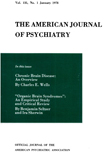Abstract
Certain special features of the circumstances surrounding a group of Allied prisoners of war held for 3 years by the Japanese were so stern and sufficiently unusual as to warrant detailed study of the patterns of reaction of several individuals. Similarities which recurred frequently were found. Nearly all the men had been ill with dysentery, beri-beri or other diseases from time to time. Most displayed difficulty in thinking, repression of anxiety with development of conversion phenomena, loss of sexual desire and obsessive preoccupation with food. Paranoid rationalization was also commonly displayed and appeared to be a device for avoiding responsibility in the overwhelmingly adverse situation in which these individuals found themselves. Although these symptoms are not ordinarily encountered in healthy individuals in normal surroundings, they were so universal in this group that they might be considered normal reactions under the circumstances. When the environment became more favorable these disturbances improved dramatically although incompletely.
Among the psychotic reactions there was observed no set pattern although paranoid trends were common to all types. The psychotics were the only patients in the group studied who showed significant depressive trends. It appears that the special circumstance of being hospitalized and thus protected from many of the stresses enabled the psychotic patients to survive.
The unusually high incidence in the group of survivors of those with psychopathic personality may indicate that in the original group psychopathy was common. It may, however, be because psychopathic characteristics were an aid to survival in this special situation. These individuals were emotionally blunted and lacked the restraints of conscience. Therefore, they were able to seize every opportunity to satisfy their own personal needs without consideration for the group as a whole. Furthermore, their shallowness of affect may have protected them from sustained depression or anxiety with associated anorexia which proved fatal to other prisoners.
The hysterical conversion features common to many of the group had similar survival value in that they, too, often replaced anxiety and depression. It is of special interest that the mechanism of emotional suppression which often ended in some degree of hysterical loss of function was commonly invoked by those in our group who were considered to have generally well integrated and non-neurotic personalities. It indicates the truth of the old cliché that everyone has a breaking point given an adverse situation of sufficient magnitude. It further accents the economy of hysterical emotional detachment and suppression.
In general, it appears that the experience had a comparatively long lasting handicapping effect on the personality adjustments of even the best integrated of these individuals. Among those heard from after a year of repatriation, although some were functioning adequately in productive capacities, few were completely well and happy and effectively engaged in a suitable job. Evaluation of the end result must await the passage of more time.

